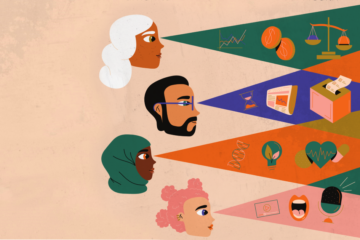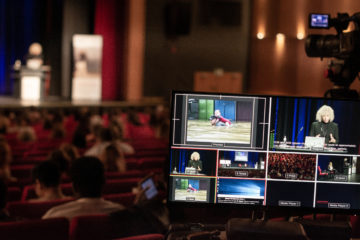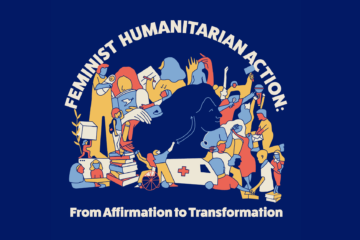Out of Sight, Out of Mind?
Unveiling Attention and Neglect in Humanitarian Action and Global Health
On behalf of Médecins Du Monde, the German Red Cross, the Berlin Chamber of Physicians and Médecins Sans Frontières, we invited you to last year’s Humanitarian Congress Berlin: ‘Out of Sight, Out of Mind? Unveiling Attention and Neglect in Humanitarian Action and Global Health’.
We strived to make that event as accessible and inclusive as possible. The congress will have live captions in English in the Münzenbergsaal and translations into French and Spanish (for the online audience). For better screen readability, you could download the agenda here.
10:00 – 11:00 | Münzenbergsaal & Salon (recording available)
Welcome Note & Keynote Discussion
Welcome Note & Keynote Discussion
Welcome Note:
Dr. Parnian Parvanta | President, Doctors Without Borders Germany
Keynote Speaker:
Ruona Meyer | Journalist and Manager, Africa Initiative, Solutions Journalism Network
Isabel Schayani | Journalist, Commentator and Moderator, Westdeutscher Rundfunk
Chair:
Dr. Glenda Cooper | Researcher, Department of Journalism, University of London
11:30 – 12:30 | Münzenbergsaal (recording available)
Shaping the decade ahead: Interconnections of attention and humanitarian principles
Shaping the decade ahead: Interconnections of attention and humanitarian principles
The panel delved into social, political, health and climate change concerns. It examined the uneven attention that crises receive, and considered whether humanitarian principles evolve from morality, conventions or operational needs. These explorations shed light on both humanitarian work and society. The discussion highlighted global responsibilities and the future of the humanitarian system.
Nikolaus Blome | Journalist andPolitical Editor, RTL/NTV
Dr. Fiona Terry | Head of Centre for Operational Research and Experience, ICRC
Prof. Michael Onyebuchi Eze | Lecturer, California State University
Chair:
Annie Slemrod | Journalist, The New Humanitarian
11:30 – 12:30 | Salon
From Ebola to Tuberculosis: Understanding deadly neglect in global health
From Ebola to Tuberculosis: Understanding deadly neglect in global health
This session aimed to shed light on the critical issues of neglect and inadequate responses to long-known infectious diseases. While the reasons for the lack of access to life-saving vaccines, medicines, and tests for various diseases can vary regionally, there are common threads of neglect and inadequate access that span different infectious diseases. The panel explored the different dimensions of structural neglect in Global Health and actionable measures to address the neglect.
Fatima Hassan | Director and Founder, Health Justice International
Dr. Abdulkarim Ekzayez | Senior Research Associate, King’s College London
Michelle Childs | Policy Advocacy Director, Drugs for Neglected Diseases initiative (DNDi)
Chair:
Katri Bertram | Global Health Consultant
13:30 – 14:30 | Münzenbergsaal (recording available)
Neglected, forgotten, historic: What good do crises categorizations do?
Neglected, forgotten, historic: What good do crises categorizations do?
This event looked at who holds authority over categorizations like “neglected crisis” or superlatives like “unprecedented crisis” and what good or harm they actually do. It deep-dived into the power and role of different actors in driving dominant narratives. It also discussed the usefulness of such categorizations and narratives, and whether attention created that way actually translates into real support.
Zahra Nader | Editor-in-Chief, Zan Times
Martin Suvatne | Managing Director, Norwegian Refugee Council Germany
Gemma Connell | Chief, Assessment, Planning & Monitoring Branch, OCHA
Chair:
Sophie Desoulieres | Head of Humanitarian Affairs, Doctors Without Borders Netherlands
13:30 – 14:30 | Salon
Time to Change: Climate change and the temporalities of the humanitarian sector
Time to Change: Climate change and the temporalities of the humanitarian sector
Connecting interdisciplinary perspectives this panel looked at the humanitarian sector’s attention on immediate, sudden-onset contingencies requiring swift responses as well as at the climate crisis impacts spanning over decades. By applying a temporal lens, the past, present and future of humanitarianism were looked at – including its concepts and tools and interconnectedness with global inequalities. Also, the need and benefits of new alliances and cross-learning opportunities with climate scientists and the climate movement were reflected upon.
Maria Theresa Niña Espinola-Abogado | Program Manager, B-READY Global Scale-up, Oxfam
Nina Treu | Managing Director Economy and Society, Greenpeace Germany
Dr. Andrea Steinke I Research Fellow, Center for Humanitarian Action
Chair:
Dr. Remco van de Pas | Researcher, Centre for Planetary Health Policy
15:00 – 16:00 | Münzenbergsaal (recording available)
Ukraine: Perpetuating structural injustice in times of crises
Ukraine: Perpetuating structural injustice in times of crises
While the humanitarian situation in Ukraine is receiving attention, this in-depth examination of Ukraine primarily concentrated on the precise definition of ‘vulnerability’ as a fundamental humanitarian criterion and the mechanisms that concern vulnerable and marginalized populations, who often fall through the cracks in the sectoral divisions established by the humanitarian system. It delved into the perspectives of humanitarian actors, researchers, and affected individuals regarding the necessary changes to address structural injustices affecting neglected vulnerable populations and their relationship to additional disasters.
Elena Voskresenskaya I Executive Director, AIDS Foundation East-West
Lisa Eckenwiler | Associate Professor of Philosophy and Director of Health Care Ethics, George Mason University
Zainab Moallin | Research Officer, Overseas Development Institute
Dmytro Drizhd | Country Representative, arche noVa Ukraine
Chair:
Renaud Boulet | Board Member, Médecins du Monde France
15:00 – 16:00 | Salon
Colombia: Impact of migration, climate crises and internal conflict on health needs and services
Colombia: Impact of migration, climate crises and internal conflict on health needs and services
Exploring advancements in healthcare provision within a humanitarian crisis setting amidst concurrent challenges arising from migration, climate crises, and conflicts, this session used Colombia as a case study to reveal pitfalls in public and financial attention. The experts involved examined the reasons behind the lack of sustainable recognition and funding for effective initiatives and how this correlates with public attention shifting towards crises or downturns.
Dr. Francisco Moreno | Secretary General, Colombian Red Cross
Jessica Chaix | Technical Assistant, ECHO
Chair:
Margarita Arias | Director of Strategic Partnerships, Colombian Red Cross
10:00 – 11:00 | Münzenbergsaal & Salon (recording available)
Welcome Note & Keynote Discussion
Welcome Note & Keynote Discussion
Welcome Note:
François De Keersmaeker | Executive Director, Médecins du Monde Germany
Keynote Speaker:
Tirana Hassan | Executive Director, Human Rights Watch
Sorcha O’Callaghan | Director, Humanitarian Policy Group, Overseas Development Institute
Chair:
Ed Schenkenberg van Mierop | Executive Director, HERE-Geneva
11:30 – 12:30 | Münzenbergsaal (recording available)
Fatal side effects: Historical gendering in medical science, practice and drugs
Fatal side effects: Historical gendering in medical science, practice and drugs
The centerpiece of this session was an exploration of how the historical gendering of medicine prioritizes specific types of knowledge and creates barriers for critical and feminist research. The panel delved into the medical framework’s impact on current gender inequalities by examining the roles of biological differences and socio-cultural power structures in healthcare research and services. It also addressed how specific groups are particularly neglected within the fields of medical education, drug development, and healthcare.
Sarah Graham I Journalist and Author
Dr. Sitra Nuredin | Program Officer, Woman in Global Health
Prof. Sabrina Schmitt | Lecturer, Frankfurt University of Applied Sciences
Chair:
Elisa Visconti | Executive Director, Médecins du Monde Italy
11:30 – 12:30 | Salon
The Rohingya: Neglected in plain sight for decades
The Rohingya: Neglected in plain sight for decades
The plight of the Rohingya people, facing a crisis characterized by its protracted nature and recurring spikes in violence, desperation, and marginalization, was used as an illustration of compassion fatigue and humanitarian neglect. In addition to analyzing the current situation, panelists discussed and demonstrated why and how humanitarian actors seek new strategies to raise awareness and implement lasting solutions. This includes methods such as creative advocacy, community engagement, and reframing narratives.
Andrea Marshall | Program Director Displacement and Dialogue South Asia, DW Akademie
Dr. Ambia Perveen | Chairperson, Rohingya Medics Organisation
Chris Melzer | Senior External Relations Officer, UNHCR Germany
Jason Mills | Regional Humanitarian Advisor, Doctors Without Borders Southeast, East Asia & Pacific
Chair:
Hannah Newbery | Migration and Integration Policy Advisor, Friedrich-Ebert-Stiftung
13:30 – 14:30 | Münzenbergsaal (recording available)
When the world moves on, local actors stay: How to face humanitarian challenges of forgotten crises
When the world moves on, local actors stay: How to face humanitarian challenges of forgotten crises
In a series of TedTalk-style presentations, local humanitarian actors from contexts often considered neglected (Lebanon, Chad and the Philippines) emphasized the detrimental impacts of the currently attention-driven humanitarian system. They also explained how, despite these challenges, they continued to provide assistance to communities in need. Together with the audience, they presented and reflected upon systemic solutions to address the humanitarian attention spiral.
Fatima Khaddour | Head of Programs, Basmeh and Zeitoonah
Nanette Antequisa | Executive Director, Ecosystems Work for Essential Benefits
Mahamat Moussa Djibert | Manager, Help Chad Development Association
Chair:
Badra Yusuf | Managing Director, RAAGSAN Consulting
13:30 – 14:30 | Salon
The digital dilemma: Balancing efficiency and ethics in humanitarian action
The digital dilemma: Balancing efficiency and ethics in humanitarian action
This panel delved into pivotal questions: who shapes tech norms, us or tech? Does society honour human dignity or see people as mere data? Digital tools do and will further boost humanitarian aid provision in terms of efficiency but equally so raise trust, exclusion and bias issues. It’s a double-edged sword for humanitarianism, promising progress and posing doubt. Efficiency met ethics in this discourse.
Karl Steinacker | Lecturer, Alice Salomon Polytechnical University, Berlin
Grace Mutung’u | Research Fellow, Centre for IP and IT Law, Strathmore University Nairobi
Massimo Marelli | Head of Delegation for Cyberspace, ICRC Luxembourg
Dr. Benjamin Herfort | Product Manager, HeiGIT
Chair:
Astrid Ziebarth | Senior Fellow Tech and Society, German Marshall Fund
15:00 – 16:00 | Münzenbergsaal (recording available)
South Sudan: Leaving no one behind in neglected crises
South Sudan: Leaving no one behind in neglected crises
This panel looked at how neglected, forgotten, and/or underfinanced crises’ contexts result in reduced efforts to reach those most at risk, for whom humanitarian action requires more specific targeting and attention to underlying risk factors. The panel discussed how these constraints impact the much-needed capacity development and technical support to ensure that no one is left behind. The panel also explored opportunities to strengthen the capacity of local actors and persons with disabilities to be empowered actors of change and applied an intersectional lens throughout.
John Kimani | Advisor, United Disabled Persons of Kenya
Umikalthum Shukri Noor | Humanitarian Affairs Officer, UNOCHA
Mauot Anyang | South Sudan Union of the Visually Impaired and International Disability Alliance
Grace Awino | Head of Gender, Protection and Accountability to Affected Populations, WFP South Sudan
Chair:
Haakon Spriewald | Project Coordinator, Handicap International
15:00 – 16:00 | Salon
Building support while ensuring dignity: How to professionalize humanitarian attention
Building support while ensuring dignity: How to professionalize humanitarian attention
This workshop session offered a distinctive blend of practical and theoretical perspectives to delve into the ethics of ensuring dignity in the use of media as an awareness raising tool in humanitarian action. In order to understand how visual media can serve as a tool for raising awareness in humanitarian efforts, practical issues, best practices and potential guidelines about who, when, and why one should use what medium will be explored.
Mareike Günsche | Photographer, The Human Perspective
Nils Carstensen | Humanitarian Worker and Documentarist, Local to Global Protection
Chair:
Dr. Lars Löfquist | President and Director, Network on Humanitarian Action
16:00 – 16:30 | Münzenbergsaal (recording available)
CLOSING REMARKS AND RECAP
CLOSING REMARKS AND RECAP
Badra Yusuf | Managing Director, RAAGSAN Consulting
Nancy Balfour | Managing Trustee, Centre for Humanitarian Change
11:00 – 11:30 | Online
Welcome Note & Keynote
Welcome Note & Keynote
Welcome Note:
Dr. Peter Bobbert | President of the Berlin Chamber of Physicians
Keynote Speaker:
Patrick Gathara | Senior Editor for Inclusive Storytelling, The New Humanitarian
Chair:
Badra Yusuf | Managing Director, RAAGSAN Consulting
11:30 – 12:30 | Online
Feelgood narratives for harsh realities: The origins and consequences of oversimplification
Feelgood narratives for harsh realities: The origins and consequences of oversimplification
With ever increasing, all pressing, interconnected crises and in absence of political will to solve crises, we are constantly targeted by diverse actors bargaining for our attention and money, both online and offline. This session looked at the implications and consequences of humanitarian actors using oversimplistic and corporate messaging for fundraising and attention.
Hala Al-Karib | Regional Director, Strategic Initiative for Women in the Horn of Africa
John Bryant | Research Fellow, Humanitarian Policy Group, Overseas Development Institute
Mina Jaf | Refugee Advocate and Founder, Women’s Refugee Route
Frances Nguyen | Journalist and Editor, Women’s Media Center – Women Under Siege
Chair:
Paul van den Berg | Political Adviser, Cordaid
13:00 – 14:00 | Online
Notorious ignorance: Anthropology and attention in the humanitarian sector
Notorious ignorance: Anthropology and attention in the humanitarian sector
Humanitarian attention disparities, rooted in different priorities and implicit hierarchies, carry significant costs and risks. Understanding humanitarian practitioners’ and institutional donors’ shifts in attention, including whose voices are prioritized and why, especially in the context of local communities, is crucial. This panel explored these dynamics and their impact, drawing from anthropological critique to reshape humanitarianism’s future.
Pedro Silva Rocha Lima | Convenor of the Anthropology, Humanitarianism Network
Jean-François Véran | Senior Humanitarian Advisor, Doctors Without Borders France
May Zin Win Soe | Researcher, Covenant Development Institute
Chair:
Anne-Meike Fechter | Professor in Anthropology and International Development, University of Sussex
14:30 – 15:30 | Online
Social media, activism and advocacy: Advantages and limitations
Social media, activism and advocacy: Advantages and limitations
Social media has undoubtedly become a central and indispensable tool for international NGOs, political and social movements and activists, all of whom are trying to achieve the main goal of drawing global attention to certain issues and causes. This panel therefore aimed to discuss in depth the strengths and weaknesses of social media and online activism, drawing a comparison with more ‘traditional’ forms of activism, and finally exploring the question of advocacy on behalf of other communities through online means.
Lateef Johar | Human Rights Advocate and Social Media Activist
Sharmila Hashimi | Activist and Journalist, Handbook Germany
Maryna Hovorukhina | Advisor, Common Sense Communications
Chair:
Fatouma Belarbi | Head of Communications, Médecins du Monde France
At last Year’s Humanitarian Forum you had the opportunity to contribute to critical discussions, explore innovative research and approaches and connect with like-minded individuals interested in the topic area. We were looking forward to welcoming the following exhibitors:
Doctors of the World e.V.
Doctors without Borders e.V.
German Red Cross
Help – Hilfe zur Selbsthilfe
Handicap International e.V.
Network on Humanitarian Action
OXFAM Germany
Heidelberg Institute of Global Health
arche noVa – Initiative for People in Need e.V.
Caritas Germany
University College London: Institute for Global Health
Centre for Humanitarian Action e.V.
Akkon University of Applied Human Sciences
Dråpen i Havet / Stagona
Center for International Peace Operations



